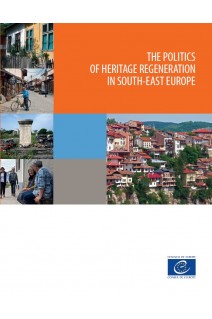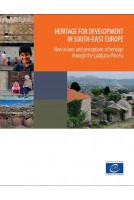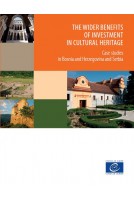



Recent developments in cultural heritage policy and practice in South-East Europe.
Since 2003, the Council of Europe–European Commission joint initiative known as the “Ljubljana Process: rehabilitating our common heritage” has set out to unlock the potential of the region’s rich immovable cultural heritage, working with national authorities to accelerate the development of democratic, peaceful and open societies, stimulate local economies and improve the quality of life of local communities.
In 2003, the region was overcoming the effects of the traumatic transition to a market economy. Since then, it has been hit hard by the economic crisis of 2008, and more recently by an unprecedented migration crisis. Despite the challenges facing the region in the field of cultural heritage, the present situation can be seen as an opportunity to use the lessons learned from the Ljubljana Process to avoid the traps laid by the cumulative and sometimes inconsistent heritage-protection legislation of the past 60 years, overcoming the legacy of the top-down approach that privileges the “high art” canon rather than the local heritage that reflects the culture of everyday life and which often means more to most people. The authors suggest that selecting from innovative practice elsewhere could make heritage management smarter so that it more directly meets the needs of modern society and individual citizens.
This volume reflects the views of international experts involved in the joint initiative and complements earlier studies on the impact of the Ljubljana Process by experts from within the region (Heritage for development in South-East Europe, edited by Gojko Rikolović and Hristina Mikić, 2014) and from the London School of Economics and Political Science (The wider benefits of investment in cultural heritage. Case studies in Bosnia and Herzegovina and Serbia, edited by Will Bartlett, 2015).
Contents
FOREWORD
INTRODUCTION (Martin Cherry)
PART ONE – BACKGROUND
Chapter 1.1 – The technical co-operation programme: context and evolution (John Bold)
Chapter 1.2 – Socio-economic and historical background (Will Bartlett)
Chapter 1.3 – Cultural heritage in South-East Europe (Martin Cherry)
PART TWO – PRINCIPLES AND POLICIES
Chapter 2.1 – The project: principles and methodology 2003-13 (John Bold and Robert Pickard)
PART THREE – MAKING THE PROCESS WORK
Chapter 3.1 – Introducing the wider issues (John Bold)
Chapter 3.2 – Partnership and funding (Will Bartlett)
Chapter 3.3 – Policies and strategies (Robert Pickard)
Chapter 3.4 – From saving to conservation (David Johnson)
Chapter 3.5 – Realising the potential of heritage regeneration (Will Bartlett, Nancy McGrath and John Baguley)
PART FOUR – THREATS AND OPPORTUNITIES
Chapter 4.1 – The concept of heritage (John Bold)
Chapter 4.2 – Priorities and public perceptions – The Ljubljana Process and European cultural heritage strategies for the 21st century (Martin Cherry)
ABOUT THE AUTHORS
Télécharger un extrait (1000)







Recent developments in cultural heritage policy and practice in South-East Europe.
Since 2003, the Council of Europe–European Commission joint initiative known as the “Ljubljana Process: rehabilitating our common heritage” has set out to unlock the potential of the region’s rich immovable cultural heritage, working with national authorities to accelerate the development of democratic, peaceful and open societies, stimulate local economies and improve the quality of life of local communities.
In 2003, the region was overcoming the effects of the traumatic transition to a market economy. Since then, it has been hit hard by the economic crisis of 2008, and more recently by an unprecedented migration crisis. Despite the challenges facing the region in the field of cultural heritage, the present situation can be seen as an opportunity to use the lessons learned from the Ljubljana Process to avoid the traps laid by the cumulative and sometimes inconsistent heritage-protection legislation of the past 60 years, overcoming the legacy of the top-down approach that privileges the “high art” canon rather than the local heritage that reflects the culture of everyday life and which often means more to most people. The authors suggest that selecting from innovative practice elsewhere could make heritage management smarter so that it more directly meets the needs of modern society and individual citizens.
This volume reflects the views of international experts involved in the joint initiative and complements earlier studies on the impact of the Ljubljana Process by experts from within the region (Heritage for development in South-East Europe, edited by Gojko Rikolović and Hristina Mikić, 2014) and from the London School of Economics and Political Science (The wider benefits of investment in cultural heritage. Case studies in Bosnia and Herzegovina and Serbia, edited by Will Bartlett, 2015).
Attention, en vertu de nos conditions générales de vente, l'achat des PDF/epub est réservé aux particuliers.
